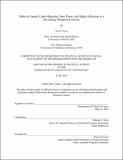| dc.contributor.advisor | Michael J. Piore. | en_US |
| dc.contributor.author | Ruiz, Neil G | en_US |
| dc.contributor.other | Massachusetts Institute of Technology. Department of Political Science. | en_US |
| dc.coverage.spatial | a-ph--- | en_US |
| dc.date.accessioned | 2014-12-08T18:08:40Z | |
| dc.date.available | 2014-12-08T18:08:40Z | |
| dc.date.copyright | 2014 | en_US |
| dc.date.issued | 2014 | en_US |
| dc.identifier.uri | http://hdl.handle.net/1721.1/92054 | |
| dc.description | Thesis: Ph. D., Massachusetts Institute of Technology, Department of Political Science, 2014. | en_US |
| dc.description | This electronic version was submitted by the student author. The certified thesis is available in the Institute Archives and Special Collections. | en_US |
| dc.description | Cataloged from student-submitted PDF version of thesis. | en_US |
| dc.description | Includes bibliographical references (pages 251-271). | en_US |
| dc.description.abstract | Development scholars, heavily influenced by the cases of the four Asian Tigers (Hong Kong, Singapore, South Korea, and Taiwan), have attributed success in economic development to education. Although the Philippines seemed even more promising before the Asian Tigers began developing, the educational advances in the Philippines have led to an enormous exodus of labor. Failing to integrate its highly educated labor force in the domestic economy, the Philippine state focused its attention on exporting college-educated/highly-educated workers by creating a set of elaborate institutions to facilitate overseas employment. As a result, currently over 10 percent of its citizens live abroad in over 160 countries and about 4,600 Filipinos leave the country every day for overseas work. Why did the Philippine government develop institutions for exporting labor and why has it continued for the past four decades? This dissertation explains how the management of post-secondary educational institutions influenced the initiation and continuation of the Philippine labor export program. From its start, two interrelated problems motivated the creation of the Philippine labor exporting state: (1) over-development of the educational system through an unregulated, laissez-faire approach to private higher education and (2) underdevelopment of the economy to absorb high-skilled labor in the domestic labor market. President Ferdinand Marcos and his technocrats developed the 1974 labor export program to relieve the country of these twin problems by providing overseas employment for the educated unemployed and generating foreign currency revenues from the remittances received from Filipinos working abroad. Over time, political pressures from overseas Filipinos and migrant households, coupled with growing remittance revenue and a large private recruitment industry, led to further development of the labor exporting state with the creation of new state emigrant institutions for managing, protecting, and representing Overseas Filipino Workers (OFWs). These new state institutions, overseas demand for Filipino workers, domestic demand for remittances, and a highly flexible and unregulated private higher educational system continues to drive the exporting of Filipino labor to this day. Empirically, this dissertation is based on twelve months of fieldwork in the Philippines and relies on multiple research methods: archival research, statistical methods empirically testing the relationship between post-secondary education and out-migration, over one hundred interviews of key actors in the labor export and higher education industries, quantitative data analysis using survey and census data from the 1950s through 2011, the creation and analysis of an original dataset of family ownership of all private higher educational institutions in the Philippines, and a review of government documents and legislation. | en_US |
| dc.description.statementofresponsibility | by Neil G. Ruiz. | en_US |
| dc.format.extent | 271 pages | en_US |
| dc.language.iso | eng | en_US |
| dc.publisher | Massachusetts Institute of Technology | en_US |
| dc.rights | M.I.T. theses are protected by copyright. They may be viewed from this source for any purpose, but reproduction or distribution in any format is prohibited without written permission. See provided URL for inquiries about permission. | en_US |
| dc.rights.uri | http://dspace.mit.edu/handle/1721.1/7582 | en_US |
| dc.subject | Political Science. | en_US |
| dc.title | Made for export : labor migration, state power, and higher education in a developing Philippine economy | en_US |
| dc.title.alternative | Labor migration, state power, and higher education in a developing Philippine economy | en_US |
| dc.type | Thesis | en_US |
| dc.description.degree | Ph. D. | en_US |
| dc.contributor.department | Massachusetts Institute of Technology. Department of Political Science | |
| dc.identifier.oclc | 895636278 | en_US |
